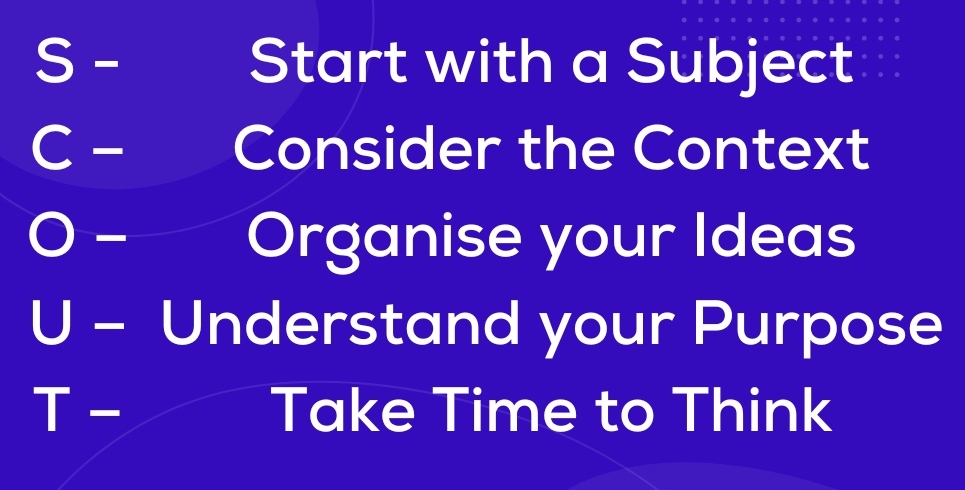Mastering Exam Techniques – Command Words, Question Analysis and More
Exams: they’re a necessary part of our education system, and yet for many, they’re a source of stress and anxiety. But what if you could approach your next exam with the confidence of understanding not just the content, but also the structure and mindset behind it? Imagine knowing precisely what the examiner is looking for in each answer. In this guide, we’ll delve deep into exam techniques that will equip you to think like an examiner. By adopting this mindset, you’ll be well on your way to achieving the grades you’ve worked so hard for. Let’s get started on this transformative journey.
The Psychology Behind Exam Techniques
When we think of exams, our minds often jump to countless hours of revision, stacks of notes, and that gnawing feeling of hope that we’ve covered all possible topics. But beyond the content lies a crucial layer many overlook: the psychology behind exam techniques.
Exams aren’t merely a test of knowledge; they’re a testament to our ability to present what we know under pressure, within time constraints, and in a format that aligns with what examiners are seeking. This requires not just memory, but also strategy, understanding, and psychological finesse.
Diving into the psychology behind exam techniques helps unravel the mystery of why some students, even with immense knowledge, don’t perform as well as others. It’s not enough to simply know the answers; one must also understand the optimal way to convey that knowledge.
Exam setters are, after all, human. They have patterns, tendencies, and biases. They set questions based on a curriculum, but also with a psychology in mind, hoping to discern who has a genuine grasp of the topic. When a student begins to think like an examiner, they’re not only preparing content; they’re also anticipating the design and structure of the exam itself.
In essence, understanding the psychology behind exam techniques is a two-fold task. First, it’s about recognising the cognitive strategies that optimise memory retrieval and presentation. And second, it’s about stepping into the shoes of an examiner, predicting their expectations, and tailoring your answers accordingly.
As we delve deeper into this topic, we’ll uncover strategies grounded in psychological principles, aiming to boost not just recall, but also presentation. With this approach, students are not merely regurgitating facts; they’re showcasing a holistic understanding, both of the subject at hand and the intricate dance of the exam process itself.
The Critical Steps of Question Analysis

Unpacking an exam question isn’t merely about reading; it’s about comprehension at a nuanced level. Your first read sets the tone, but the subsequent deep dive uncovers layers of meaning pivotal to crafting a top-tier answer. Every word has a role to play, and in understanding this, students can align their response perfectly with what the examiner is seeking.
Spotting Command Words
Command words are the directors of your answer. They provide the general pathway you should tread. Words like ‘describe’, ‘explain’, ‘compare’, or ‘illustrate’ each hold unique expectations. Understanding their distinct requirements is paramount.
When an exam paper says “describe,” it’s not asking for a mere regurgitation of facts. It’s seeking a detailed representation. “Explain,” on the other hand, is an invitation to delve deeper, to showcase the underlying mechanics of a concept. Each command word has its own set of expectations and answering them precisely is the key to harnessing their potential.
Understanding these terms is more than just a vocabulary exercise. It’s about tapping into the mindset of the examiners, who use these words as signals, guiding students on the depth, type, and breadth of answer they’re expecting. The clearer our grasp of these command words, the better our ability to meet those expectations head-on.
Yet, why is it that many students, despite knowing their subject matter, falter when faced with these command words? The oversight often lies in underestimating their significance. For some, ‘analyse’ and ‘evaluate’ might seem interchangeable, but in the world of exams, they represent distinct tasks. One asks for a breakdown, the other for judgement.
Zeroing in on Key Terms
Beyond the command words, each question is laced with specific terms that determine the scope of your answer. These aren’t mere words; they are anchors. Misinterpreting a single term can sway your entire response off-course. Grasping them ensures your answer remains rooted in relevance.
Deciphering the Context
Many questions come wrapped in scenarios or examples that provide context. This isn’t window dressing; it’s a cue. It informs the backdrop against which you set your answer, helping to mould a more tailored, pinpointed response.
Allocating Time Judiciously
While this may sound like exam strategy 101, the importance of time allocation based on a question’s weightage cannot be overstated. It’s not just about allotting time but understanding the depth a question requires based on its marks.
SCOUT: The Pre-Writing Strategy

Before the ink hits the paper, you should ‘SCOUT’ the terrain:
- S: Scan the question for immediate clues.
- C: Command words identified? Check!
- O: Outline the main points you’ll address.
- U: Understand the context and adjust your tone accordingly.
- T: Time-check. Adjust your pace based on the question’s weightage.
With these analytical steps embedded into their approach, students evolve from merely answering to articulating with precision. The upcoming sections will delve deeper into the intricacies of each step, ensuring you’re equipped to navigate the exam landscape with confidence.
Tapping into Examiner Reports – Think Like an Examiner
Examiners are not enigmatic entities; they’re educators with a singular goal in mind: to gauge understanding. It’s no wonder, then, that they provide one of the most invaluable resources for students – the examiner report. Delving into these reports is akin to being handed a roadmap of pitfalls to avoid and strengths to accentuate. Let’s uncover how you can leverage these golden insights for your examination preparation.
Identifying Recurring Trends
Each year, there are common mistakes that students tend to make. By perusing examiner reports, you’ll spot patterns and understand which areas are typically misunderstood or poorly answered. This allows you to shore up those weak points in your revision.
Understanding Examiner Expectations
The phrasing in the report often provides a glimpse into what examiners are truly seeking in responses. Whether they highlight the need for ‘detailed explanations’, ‘concise summaries’, or ‘practical applications’, you get a clear sense of how to shape your answers.
Discovering Exemplary Answers
Some reports feature high-scoring student answers as examples. Studying these gives you a model to emulate in terms of structure, depth, and style. It’s not about rote learning, but understanding the calibre of response that earns top marks.
Clarifying Misconceptions
Examiners often point out frequent misconceptions that students harbour. By being aware of these, you can steer clear of them in your preparation and answers, ensuring that your understanding is accurate and robust.
Optimising Your Answering Technique
Beyond content, examiners often comment on the way students approach questions – from structure to argumentation. By heeding their advice, you can fine-tune your technique to align more closely with what’s expected.
In essence, examiner reports are more than just post-mortem documents of past exams. They’re treasure troves of insights and advice that, when tapped into wisely, can significantly elevate your exam performance. Don’t neglect this resource; embrace it as a central pillar of your revision strategy.
Self-assessment: Becoming Your Own Examiner
Transitioning from the passive role of a learner to the proactive stance of an examiner is a transformative experience. When you begin to appraise your own work critically, a new world of self-awareness and insight opens up. The ability to self-assess provides you with autonomy, fostering independence in your learning journey. But how can one cultivate this essential skill? Here’s a deeper dive into the art of self-assessment.
Embracing the Marking Criteria
It all begins by understanding the metrics against which your work is judged. Familiarise yourself with the marking criteria or rubric for each subject. This not only gives you a clear goal but also serves as a consistent reference point during your revision.
Detaching Emotion from Evaluation
As creators of our own work, we often become emotionally attached to it. While this is natural, it’s imperative to develop an objective lens when assessing your own answers. Step back, give it some time, and then return to your work as if it was penned by someone else.
Constructive Criticism over Negative Feedback
Self-assessment doesn’t equate to self-deprecation. It’s about identifying areas for improvement without undermining your confidence. Instead of berating yourself for mistakes, focus on actionable feedback that can guide your subsequent revision.
Mirroring Examiner Comments
Revisit examiner reports and comments from past papers, and compare them to your own assessments. Are you picking up on similar trends and issues? This mirroring technique can refine your self-assessment skills over time.
Engaging in Peer Review
Sometimes, trading papers with peers and assessing each other’s work can offer new perspectives. While it’s a form of external evaluation, it can still provide insights into how you assess work in comparison to others. Plus, explaining your feedback to someone else can further cement your understanding of the marking criteria.
Regular Reflection and Iteration
Self-assessment is not a one-off exercise. It’s a continuous loop of feedback and improvement. Regularly set aside time to assess past papers, practice questions, or even notes to ensure you’re on track and improving.
In sum, self-assessment is a potent tool in your academic arsenal. It instils a sense of responsibility, deepens understanding, and empowers you to take charge of your learning trajectory. By mastering this skill, you not only prepare for exams but also equip yourself for lifelong learning and self-improvement.
Structuring Long-Answers on Exams
While acronyms have long been heralded as useful tools in the realm of structured responses, we must recognise that true mastery of long-answer questions demands an approach that transcends mnemonic devices. Tackling these questions requires not just memory, but also a deeper understanding, synthesis of information, and an ability to coherently argue or explain. Here’s an exploration of strategies to elevate your long-answer game beyond mere acronyms.
Establishing a Clear Argument or Narrative
Before diving into the details, it’s vital to outline your overarching argument or narrative. This sets the stage, ensuring that every point you make contributes to the bigger picture. It also helps the examiner follow your train of thought effortlessly.
Interweaving Facts with Analysis
While it’s essential to present facts, equally crucial is weaving in your own analysis. Examiners appreciate students who can contextualise information within broader themes, demonstrating a more profound grasp of the topic.
Ensuring Seamless Transitions
Each paragraph should naturally flow from one to the next. This means crafting transitions that link ideas and ensure the reader doesn’t get lost in a sea of disjointed thoughts. A structured, fluid essay is always more compelling.
Infusing Subject-Specific Vocabulary
Demonstrate your subject knowledge by seamlessly integrating topic-specific terminology. This not only shows that you’re well-versed in the subject but also adds precision to your arguments.
Elaborating and Illustrating
While brevity is often championed, in long-answer scenarios, depth matters. When making a point, take a moment to elaborate, drawing upon relevant examples or case studies. This depth showcases your holistic understanding of the topic.
Crafting Conclusions that Resonate
Conclusions are more than just summaries. They’re your final opportunity to leave a lasting impression. Aim to craft a conclusion that ties together your arguments, addresses the question directly, and leaves the reader with a sense of closure.
Regular Practice and Feedback
Lastly, like any skill, mastering the art of long-answer writing demands regular practice. Write frequently, and seek feedback, whether from teachers, peers, or through self-assessment. Feedback provides invaluable insights into areas for improvement, helping refine your technique over time.
Customising Exam Techniques Based on Subjects

Examinations, irrespective of the subject, may seem to demand a generic set of techniques. Yet, beneath this surface-level observation lies a nuanced truth: each subject has its own unique set of challenges and demands. Recognising and adapting to these subtleties can dramatically impact your success. Let’s explore how to customise your exam techniques to align with specific subjects.
The Language of Mathematics
Maths isn’t just about numbers; it’s a language. Understand the problem, dissect it, and translate it into mathematical statements. Practice by solving a variety of problems to familiarise yourself with patterns, and always review your working steps.
The Art of Humanities
Subjects like History, Geography, or Literature require weaving knowledge into compelling narratives. Focus on understanding concepts and timelines rather than rote learning. Practise essay questions, ensuring you develop a clear argument supported by evidence.
Scientific Exploration
In the Sciences, it’s pivotal to grasp fundamental concepts and link them to real-world applications. Diagrams, flowcharts, and active recall can be invaluable. Practise past paper questions, focusing on precise, concise answers with the correct terminology.
Languages and Communication
For languages, both modern and classical, immersion and consistent practice are key. Beyond grammar and vocabulary, focus on comprehension and expression. Listen to audio clips, engage in conversation, and practise translation exercises.
The Practicality of Vocational Subjects
For subjects like Design & Technology or Business Studies, real-world application reigns supreme. Understand theories, but also focus on case studies and practical scenarios. Regularly practise scenario-based questions, emphasising clear, logical solutions.
Abstract Thought in Philosophy and Ethics
Delving into abstract concepts requires clear thought and reasoned arguments. Understand philosophical positions, develop your perspective, and engage in debates. When practising, ensure your answers offer a balanced view backed by philosophical reasoning.
Diversifying Practice for Mixed Subjects
Some subjects, like Environmental Science or Social Studies, meld various disciplines. Tackle them by segmenting topics based on their nature (e.g., scientific, social) and adapt your revision techniques accordingly.
In conclusion, while some techniques are universally applicable, the essence of excellence lies in the details. Tailoring your approach to align with the idiosyncrasies of each subject ensures you’re not just studying harder, but smarter. Embrace the diversity of subjects, adapting your techniques to extract the best from each domain.
Handling Exam Stress and Pressure
Examinations, often seen as the summation of one’s academic endeavours, naturally bring about feelings of stress and pressure. While a moderate level of stress can serve as a motivator, excessive stress can hinder performance. Acknowledging the impact of exam-related stress and employing strategies to manage it is crucial for achieving optimal results. Here’s a deep dive into understanding and effectively handling the pressures associated with exams.
Understanding the Root of Stress
Before diving into solutions, it’s essential to identify the sources of stress:
- Anticipation of Results: Fear of disappointing oneself or others can mount significant pressure. Learn more about how to deal with exam failure.
- Unpreparedness: Feeling unprepared or having gaps in knowledge.
- Past Experiences: Previous negative exam experiences can create apprehension.
- External Pressures: Expectations from parents, teachers, or peers can amplify stress.
Preparation is Key
Well begun is half done. Effective preparation is a cornerstone in reducing exam anxiety:
- Study Schedule: Set realistic study goals and stick to a structured routine.
- Active Revision: Use techniques like flashcards, mind maps, and quizzes to make revision active and engaging.
- Mock Exams: Regularly take practice tests in a simulated exam environment to familiarise yourself with the experience.
Mindfulness and Relaxation Techniques
Incorporating relaxation techniques can calm the nerves:
- Deep Breathing: Focusing on breath can help reduce anxiety.
- Meditation: Even a few minutes daily can help in maintaining focus and tranquillity.
- Visualisation: Visualise success and positive outcomes to build confidence.
Physical Well-being
Your physical health has a profound impact on your mental well-being:
- Regular Exercise: Physical activity releases endorphins, reducing stress.
- Balanced Diet: Proper nutrition fuels the body and brain, enhancing concentration and stamina.
- Adequate Sleep: Ensure 7-9 hours of sleep, especially in the days leading up to the exam.
Seeking Support
Remember, you’re not alone in this journey:
- Talk It Out: Sharing feelings with friends, family, or counsellors can provide relief and perspective.
- Study Groups: Collaborative study can help fill knowledge gaps and offer moral support.
- Professional Guidance: If stress becomes unmanageable, consider seeking professional counselling or therapy.
On the Exam Day
- Arrive Early: Give yourself ample time to settle before the exam starts.
- Stay Positive: Focus on what you know rather than what you don’t.
- Breaks: If allowed, take short breaks to stretch or breathe if you feel overwhelmed during the exam.
In conclusion, while exams are a critical aspect of academic life, they are but a snapshot of one’s abilities. Adopting a holistic approach to stress management, encompassing mental, emotional, and physical well-being, can equip you to face exams with confidence and poise. Remember, success is as much about the journey and learning as it is about the end result.
Crafting Your Exam Journey with Expert Guidance
Success, as many perceive, isn’t just about hitting the mark; it’s about the journey, the challenges faced, and the support we garner along the way. It’s about constructing bridges over obstacles, rather than just navigating around them. In this modern age, where resources are abundant, the true magic lies in finding the right kind of support tailored to your unique needs and aspirations.
Enter Edumentors, an embodiment of this belief. An online tutoring platform, Edumentors isn’t just about traditional teaching; it’s about mentorship, camaraderie, and building resilience. With tutors stemming from the UK’s top-tier universities, they’re well-equipped not merely with knowledge, but with fresh, relatable experiences. They understand the latest academic demands, the evolving landscape of examinations, and most importantly, the pressures students today grapple with.
So, as you embark on your academic journey, amidst the ups and downs, remember: you don’t have to walk the path alone. While self-belief is the foundation of success, having a mentor can provide you with invaluable insights, confidence, and guidance when you need it the most. It’s not just about preparing for an exam; it’s about preparing for life, crafting stories of perseverance, growth, and triumph.
Why wait for a sign? Let Edumentors be the guiding star on your academic horizon, helping you unlock potentials you didn’t even know existed.









